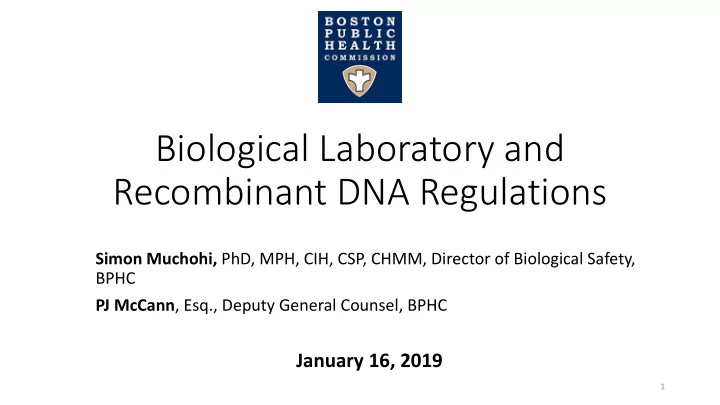

Biological Laboratory and Recombinant DNA Regulations Simon Muchohi, PhD, MPH, CIH, CSP, CHMM, Director of Biological Safety, BPHC PJ McCann , Esq., Deputy General Counsel, BPHC January 16, 2019 1
Boston Regulatory Framework Recombinant DNA Technology Use Regulations (1994) ▪ Governs research involving combining genetic material from multiple sources ▪ rDNA has become widespread and useful tool in science, medicine, biotech, ▪ agriculture 33 entities permitted ▪ Disease Surveillance and Reporting Regulations (2004) ▪ Healthcare facilities, doctors, and labs required to report infectious diseases ▪ ▪ Biological Laboratory Regulations (2006) Research in BSL-3 and BSL-4 labs in City of Boston. ▪ 7 BSL-3 and 1 BSL-4 permitted ▪ 2
Restrictions in Existing Regulations ▪ Incorporate prohibitions, restrictions, and guidelines established at the national level including: ▪ Guidelines for Research Involving Recombinant or Synthetic Nucleic Acid Molecules (NIH Guidelines) ▪ Biosafety in Microbiological and Biomedical Laboratories (BMBL) ▪ Prohibit classified research on high-risk agents ▪ Prohibit weaponization of high-risk agents ▪ Currently, prohibit rDNA work in BSL-4 labs 3
Incident and Infectious Disease Reporting ▪ Requires reporting any of the following to BPHC upon discovery: ▪ Illness ▪ Spill or accident ▪ Personnel exposure ▪ Unexplained absenteeism ▪ Failure of mechanical system (e.g. ventilation) ▪ Provide follow-up reports to BPHC including: ▪ Occupational health report ▪ Incident investigation ▪ Disease Surveillance Regulation imposes broad disease reporting requirements that apply to laboratories at all biosafety levels 4
Boston Biosafety Committee Role ▪ The BBC is an advisory group created by the Biological Laboratory Regulation and appointed by the BPHC Executive Director ▪ Met in August 2018 to review two new NEIDL BSL-4 research protocols, one of which calls for using rDNA on BSL-4 Select Agents ▪ Generation and use of recombinant filoviruses expressing fluorescent proteins Marburg and Ebola ▪ Features rDNA fluorescence inactivation technique recommended by CDC ▪ BBC supported the project and formed a working group that met in October and developed a policy recommendation to allow for rDNA work in the BSL-4 lab with appropriate safeguards ▪ Staff worked with BBC members to draft proposed amendments 5
Proposed Amendments ▪ Streamline the local regulatory framework by rescinding the 1994 rDNA Regulation and incorporating rDNA oversight into the Biological Laboratory Regulation ▪ Remove the prohibition on rDNA research on BSL-4 agents in Boston, under the condition that any rDNA project would undergo rigorous approval process for BSL-4 projects ▪ Codify the requirement from permit docs that each individual BSL-4 project undergo review by BBC and approval by BPHC ▪ Throughout, add “rDNA at BSL 2, 3, or 4” to work that is covered ▪ Revise definitions and citations to align with updated guidance 6
Public Process ✓ Amendments proposed at public Board of Health meeting ✓ Comment period ran from November 14 th to January 10 th ✓ Public notification and engagement: ✓ Notice, proposed amendments, and issue brief posted on bphc.org ✓ Notice published with City Clerk ✓ Advertised in Boston Globe ✓ Additional outreach to engage stakeholders ✓ Presented proposed amendments to December meeting of Boston Biosafety Users Group ✓ Public Hearing held on January 7 th ✓ Public comment period concluded January 10 th 7
Public Hearing - January 7 th ▪ 18 members of the public attended ▪ 14 individuals testified; all in favor ▪ Included representatives from: ▪ Boston University ▪ Boston Biosafety Committee ▪ NEIDL’s Community Liaison Committee ▪ Themes included: ▪ rDNA is critical to the safety of the research ▪ There is precedent for rDNA work in all BSL-4 labs across the country and across the world; the prohibition puts Boston scientists at a disadvantage ▪ Since most vaccine candidates include rDNA, the prohibition on rDNA use in the BSL-4 lab would prevent important vaccine testing ▪ The BSL-4 lab will still be heavily regulated 8
Written Comment - Closed January 10 th ▪ Public comment period ran from November 14 th - January 10 th ▪ 27 written commenters received. 26 in favor; 1 neutral. ▪ Organizations represented: ▪ Boston University ▪ Boston University School of Medicine ▪ Center for Regenerative Medicine (BU/BUMC) ▪ NEIDL Community Liaison Committee ▪ Associated Industries of Massachusetts ▪ National Institutes of Health-Rocky Mountain Laboratories ▪ Massachusetts Medical Device Industry Council (MassMEDIC) ▪ Massachusetts Biotechnology Council (MassBIO) ▪ Tufts University Institutional Biosafety Office 9
Written Comment Themes • The use of rDNA is a central engine of scientific progress in both academic laboratories and in the biotech industry, because it is a fundamental tool for much of modern biomedical research. rDNA is the basis for clinically used cancer therapies, vaccines, and disease testing. rDNA is routinely used in the study of pathogens at all biosafety levels (from BSL-1 to BSL-4). It is used extensively not only in the US, but internationally as well because it has proven to be critical to advancing science and enhancing biosafety. – NEIDL Investigator • As a premiere destination for biomedical research, it is vital that we are seen as a region that is progressive and willing to update regulations as science and safety evolves . – MassBIO 10
Recommendation and Vote Recommendation • Because strict federal restrictions, along with BBC and BPHC review and oversight, set appropriate mechanisms for preventing individual BSL-4 rDNA research protocols that present any unacceptable risk, and rDNA technology is an important tool for safety and scientific advancement, eliminate the blanket prohibition on rDNA work on agents requiring BSL-4 containment Vote • Rescind Recombinant DNA Technology Use Regulations • Amend Biological Laboratory Regulation as presented on November 14 th with further amendments as set forth in the revised draft 11
Implementation • Post revised Biological Laboratory Regulation • Remove rDNA Regulation • Revise Guidelines with input from Boston Biosafety Committee • Revise public information andpermit documents 12
Recommend
More recommend